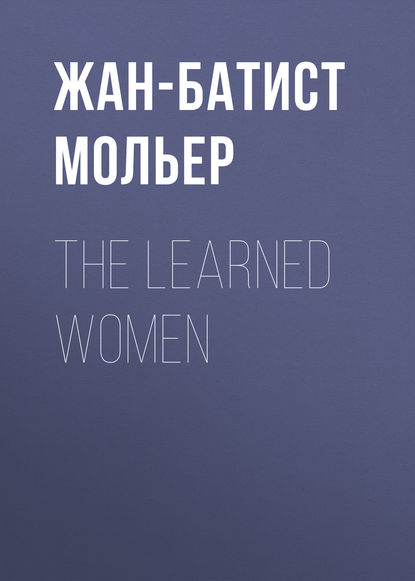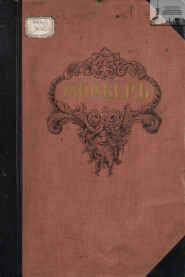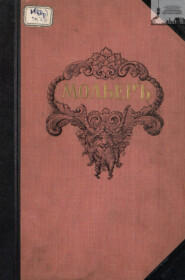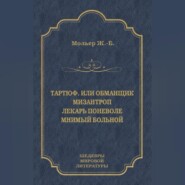По всем вопросам обращайтесь на: info@litportal.ru
(©) 2003-2025.
✖
The Learned Women
Год написания книги
2017
Настройки чтения
Размер шрифта
Высота строк
Поля
ARM. Yes, I will second you with all my power.
CLI. And I shall be sure to be most grateful.
SCENE VII. – CHRYSALE, ARISTE, HENRIETTE, CLITANDRE
CLI. I should be most unfortunate without your assistance, Sir, for your wife has rejected my offer, and, her mind being prepossessed in favour of Trissotin, she insists upon having him for a son-in-law.
CHRY. But what fancy is this that she has got into her head? Why in the world will she have this Mr. Trissotin?
ARI. It is because he has the honour of rhyming with Latin that he is carrying it off over the head of his rival.
CLI. She wants to conclude this marriage to-night.
CHRY. To-night?
CLI. Yes, to-night.
CHRY. Well! and this very night I will, in order to thwart her, have you both married.
CLI. She has sent for the notary to draw up the contract.
CHRY. And I will go and fetch him for the one he must draw up.
CLI. And Henriette is to be told by her sister of the marriage to which she must look forward.
CHRY. And I command her with full authority to prepare herself for this other alliance. Ah! I will show them if there is any other master but myself to give orders in the house. (To HENRIETTE) We will return soon. Now, come along with me, brother; and you also, my son-in-law.
HEN. (to ARISTE). Alas! try to keep him in this disposition.
ARI. I will do everything to serve your love.
SCENE VIII. – HENRIETTE, CLITANDRE
CLI. However great may be the help that is promised to my love, my greatest hope is in your constancy.
HEN. You know that you may be sure of my love.
CLI. I see nothing to fear as long as I have that.
HEN. You see to what a union they mean to force me.
CLI. As long as your heart belongs entirely to me, I see nothing to fear.
HEN. I will try everything for the furtherance of our dearest wishes, and if after all I cannot be yours, there is a sure retreat I have resolved upon, which will save me from belonging to any one else.
CLI. May Heaven spare me from ever receiving from you that proof of your love.
ACT V
SCENE I. – HENRIETTE, TRISSOTIN
HEN. It is about the marriage which my mother has set her heart upon that I wish, Sir, to speak privately to you; and I thought that, seeing how our home is disturbed by it, I should be able to make you listen to reason. You are aware that with me you will receive a considerable dowry; but money, which we see so many people esteem, has no charms worthy of a philosopher; and contempt for wealth and earthly grandeur should not show itself in your words only.
TRI. Therefore it is not that which charms me in you; but your dazzling beauty, your sweet and piercing eyes, your grace, your noble air – these are the wealth, the riches, which have won for you my vows and love; it is of those treasures only that I am enamoured.
HEN. I thank you for your generous love; I ought to feel grateful and to respond to it; I regret that I cannot; I esteem you as much as one can esteem another; but in me I find an obstacle to loving you. You know that a heart cannot be given to two people, and I feel that Clitandre has taken entire possession of mine. I know that he has much less merit than you, that I have not fit discrimination for the choice of a husband, and that with your many talents yon ought to please me. I see that I am wrong, but I cannot help it; and all the power that reason has over me is to make me angry with myself for such blindness.
TRI. The gift of your hand, to which I am allowed to aspire, will give me the heart possessed by Clitandre; for by a thousand tender cares I have reason to hope that I shall succeed in making myself loved.
HEN. No; my heart is bound to its first love, and cannot be touched by your cares and attention. I explain myself plainly with you, and my confession ought in no way to hurt your feelings. The love which springs up in the heart is not, as you know, the effect of merit, but is partly decided by caprice; and oftentimes, when some one pleases us, we can barely find the reason. If choice and wisdom guided love, all the tenderness of my heart would be for you; but love is not thus guided. Leave me, I pray, to my blindness; and do not profit by the violence which, for your sake, is imposed on my obedience. A man of honour will owe nothing to the power which parents have over us; he feels a repugnance to exact a self-sacrifice from her he loves, and will not obtain a heart by force. Do not encourage my mother to exercise, for your sake, the absolute power she has over me. Give up your love for me, and carry to another the homage of a heart so precious as yours.
TRI. For this heart to satisfy you, you must impose upon it laws it can obey. Could it cease to love you, Madam, unless you ceased to be loveable, and could cease to display those celestial charms…
HEN. Ah! Sir, leave aside all this trash; you are encumbered with so many Irises, Phyllises, Amaranthas, which everywhere in your verses you paint as charming, and to whom you swear such love, that…
TRI. It is the mind that speaks, and not the heart. With them it is only the poet that is in love; but it is in earnest that I love the adorable Henriette.
HEN. Ah, Sir, I beg of you…
TRI. If I offend you, my offence is not likely to cease. This love, ignored by you to this day, will be of eternal duration. Nothing can put a stop to its delightful transports; and although your beauty condemns my endeavours, I cannot refuse the help of a mother who wishes to crown such a precious flame. Provided I succeed in obtaining such great happiness, provided I obtain your hand, it matters little to me how it comes to pass.
HEN. But are you aware, Sir, that you risk more than you think by using violence; and to be plain with you, that it is not safe to marry a girl against her wish, for she might well have recourse to a certain revenge that a husband should fear.
TRI. Such a speech has nothing that can make me alter my purpose. A philosopher is prepared against every event. Cured by reason of all vulgar weaknesses, he rises above these things, and is far from minding what does not depend on him. [Footnote: Compare 'School for Wives,' act iv. scene vi.]
HEN. Truly, Sir, I am delighted to hear you; and I had no idea that philosophy was so capable of teaching men to bear such accidents with constancy. This wonderful strength of mind deserves to have a fit subject to illustrate it, and to find one who may take pleasure in giving it an occasion for its full display. As, however, to say the truth, I do not feel equal to the task, I will leave it to another; and, between ourselves, I assure you that I renounce altogether the happiness of seeing you my husband.
TRI. (going). We shall see by-and-by how the affair will end.
In the next room, close at hand, is the notary waiting.
SCENE II. – CHRYSALE, CLITANDRE, HENRIETTE
CHRY. I am glad, my daughter, to see you; come here and fulfil your duty, by showing obedience to the will of your father. I will teach your mother how to behave, and, to defy her more fully, here is Martine, whom I have brought back to take her old place in the house again.
HEN. Your resolution deserves praise. I beg of you, father, never to change the disposition you are in. Be firm in what you have resolved, and do not suffer yourself to be the dupe of your own good-nature. Do not yield; and I pray you to act so as to hinder my mother from having her own way.
CHRY. How! Do you take me for a booby?
HEN. Heaven forbid!
CHRY. Am I a fool, pray?
HEN. I do not say that.
CHRY. Am I thought unfit to have the decision of a man of sense?
HEN. No, father.

















